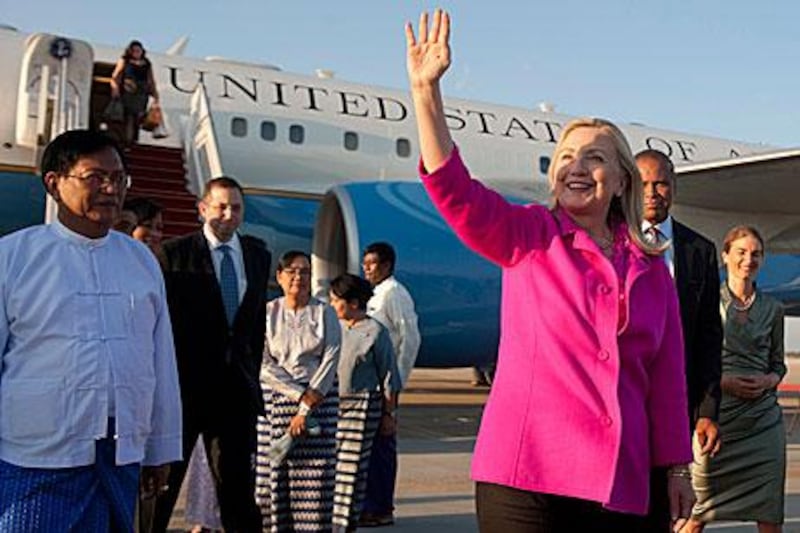BEIJING // Hillary Clinton, the US secretary of state, arrived in Myanmar yesterday, further demonstrating Washington's willingness to strengthen its presence in Asia amid concern over China's growing regional influence.
Mrs Clinton is the most senior US official to visit Myanmar since the military took power in 1962 and her three-day trip comes after tentative signs of reform from a regime often seen as one of the world's most repressive.
For the US, the challenge is to balance the desire to tease Myanmar away from China, on which the country has an acute economic, military and political dependence, while not alienating human-rights campaigners concerned that Myanmar could be welcomed into the global community without further political liberalisation.
Mrs Clinton was to meet the president, Thein Sein, a civilian who had a four-decade military career, and the foreign minister, Wunna Maung Lwin, today in the capital, Naypyidaw.
Speaking in South Korea before flying to Myanmar, Mrs Clinton told reporters she wanted to determine for herself what the government's intentions were on political and economic reforms.
"But obviously, we and many other nations are quite hopeful that these 'flickers of progress' ... will be ignited into a movement for change that will benefit the people of the country," Mrs Clinton said, referring to a phrase the US president, Barack Obama, used in describing the signs of change in Myanmar.
Myanmar's gas and mineral riches represent opportunities for US firms shut out by sanctions after a 1988 crackdown on democracy campaigners. Instead, Chinese companies have secured a dominant role in the country's energy-hungry economy, sparking anxiety.
"During the last several years, more and more people in Myanmar ... on the streets, in the business sector, in government, in the military, the media have become worried about Myanmar's - if not complete - then too much dependence on China for almost every major thing," said Ding Xueliang, a professor and political analyst at Hong Kong University of Science and Technology.
By initiating reforms, such as the release of political prisoners, Myanmar's rulers have raised the prospect of closer ties to western nations, counterbalancing the influence of China, which has been responsible for infrastructure projects ranging from ports to roads.
"Hillary Clinton's visit is perhaps the most important signal of adjustment by major western countries," said Prof Ding, adding China was "quite worried about the situation".
Myanmar has recently moved to stem Chinese influence, in September calling a halt to a US$3.6 billion (Dh13.2bn) dam China was building, following environmental concerns.
An editorial in yesterday's Global Times, a Chinese newspaper often seen as nationalistic, highlighted Beijing's anxiety.
Saying it was "certain that the US and China are competing for influence over Myanmar", the newspaper said the dam cancellation "made some believe that Myanmar is showing goodwill to the West at the expense of Chinese interests".
"China has no resistance toward Myanmar seeking an improved relationship with the West, but it will not accept this while seeing its own interests stamped on," the newspaper said.
This evening, Mrs Clinton will have dinner with the Nobel peace laureate and democracy advocate Aung San Suu Kyi, ahead of a formal meeting tomorrow.
Ms Suu Kyi spent had most of the past two decades under house arrest after her National League for Democracy won elections in 1990. She was freed a year ago in one of the most visible signs of political reform.
Elections last year also indicated the authorities' willingness to demonstrate reforming credentials, and the National League for Democracy plans to take part in forthcoming polls.
Yet campaigners say hundreds of dissidents remain behind bars and have expressed concern over the treatment of minorities and alleged abuses by the military.
Mrs Clinton's Myanmar trip comes weeks after Mr Obama visited Australia, where plans for a US troop presence in the north of the country were announced in another move interpreted limiting China's influence in the Asia-Pacific.






